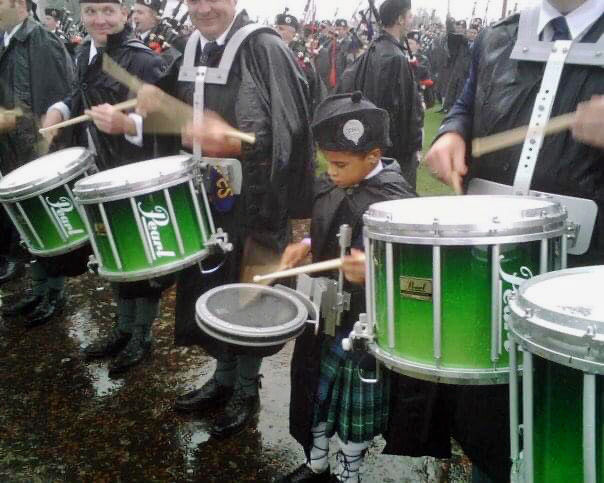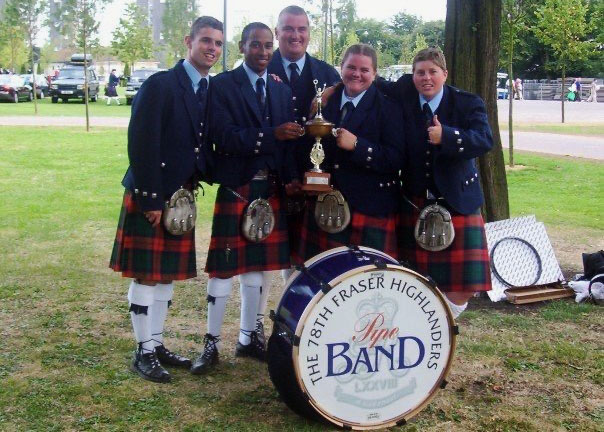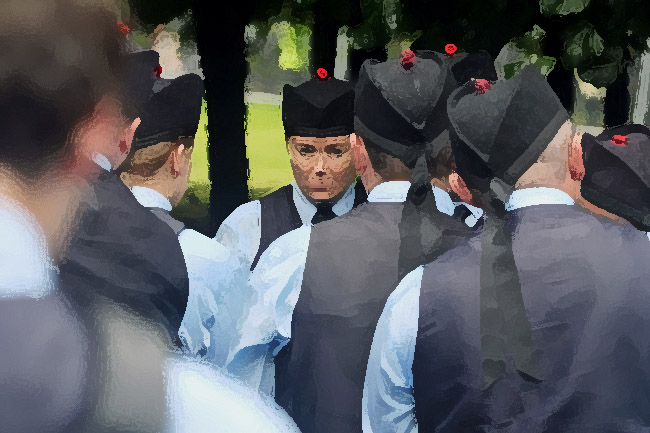Is piping and drumming a welcome place for Black players? – Part 1
Most of us, we can assume, think of the piping and drumming world as a welcoming and all-inclusive place, and for the most part, it is.
While the pipe band arts emanated from the British military, which in turn was up until only a few decades ago was pretty much all-white and all-male, civilian pipe bands have become more diverse.
In these pages, we have often discussed the plight and the advent of females in piping and drumming. Until about 1970, women, with rare exceptions, were relegated to “Ladies” and “Girls” bands. Until 1976, female pipers weren’t allowed to compete at many of the major competitions in the UK. Until the last decade, women weren’t allowed to be members of the Royal Scottish Pipers Society.
There is still a long way to go. Women comprise only about 25% of pipers and drummers. Many females who participate are younger, and lose interest or replace the time with higher-priority needs, and so many tend to drop away. The number of females older than 30 in pipe bands is commensurately smaller.
Appalling incidents against Black citizens in the United States have placed a world spotlight on racism. While the USA has significant problems, no country is truly free from racist practices or attitudes, whether overt or subliminal. Peaceful protests often became violent altercations. Many hope that the struggles will be a great reckoning for countries, businesses, associations and even hobbies to look inward to consider both blatant and subtle aggressions and micro-aggressions designed intentionally or subconsciously to keep others out.
Piping and drumming is no exception.
One look at our world, and we see an almost all-white landscape. Exceptions are there, but they are few.
The vast majority of us will welcome anyone – male, female, white, Black, Asian, indigenous – who wants to learn the pipes or drum. There are no barriers, we will say, and they’re free to learn just as much as the next person.
But is that accurate?
The first step to joining is to feel welcomed. Are there people like me? could be the first question asked implicitly and tacitly in the mind. If I start this hobby, join that company, go to that school, will I feel that I belong?
It’s a difficult challenge, and it can take time since we can’t alter the demographic complexion of employees, students, members overnight.
But what are we doing to facilitate such change?
Finding Black pipers and drummers is difficult enough. Finding Black pipers and drummers who are willing to speak about their experiences is much harder.
As with other sensitive topics we’ve tackled, our intention is enlightenment and understanding by having at times tough, but necessary, conversations into the open. Only by asking questions, can we get the answers and the information we need to make better decisions.
If you’re interested in that, we invite you to read on.
The experience

Kolton Stewart is famous. Now a film, TV and music star, his first foray into the arts was in Kincardine, Ontario, learning pipe band drumming starting in 2001 as one of very few Black participants in the pipe band arts.
“I started playing drums at the age of two,” he says. “World-renowned drummers such as Tyler Fry and Craig Colquhoun, both from my hometown of Kincardine, started to encourage me and took me under their wings. Craig arranged to get me a tenor drum and custom-built the drum to fit my small size.”
Being very young and perhaps less-attuned to biases, Stewart can’t remember too much outward bias for being a Black person in a nearly all-white pipe band world.
“Because of my young age, my experiences were just feelings but not a label of ‘racism’ or bias from adults,” he says. “My mom remembers that whenever I would play drums, I would get many dirty looks from other adult drummers. This could have been because of my race or because of my age. I don’t recall any other person of colour in the pipe band that I was in except for myself.”
According to a recent pipes|drums Poll, 29% of respondents said they have “witnessed examples of racism in piping and drumming.” It’s impossible to know how many interpreted “examples” as blatant and outward transgressions, or if they included more subtle abuses, the conscious or even subconscious insidious micro-aggressions that build-up, fester, and eventually ostracize.
With that in mind, racism in our world is far more prevalent than the 29% suggests, when one considers that racial inequities are systemic and, as such, are likely not to be noticed. It’s just the way things are. We’ll talk about that a little later.
Few if any countries on earth have seen such a powerful racial change in the last 30 years as South Africa. The leadership of Nelson Mandela, combined with pressures to change exerted on the nation from countries around the world, broke down an entrenched Apartheid system of discrimination and oppression against Black South Africans.
“It’s in the novelty of a person of colour in kilt with comments like, ‘Oh! I’ve just got to have a photo of or with you and show so-and-so, otherwise, they won’t believe me.’ ” – Mandla Ndabula
Today, there are per capita more Black pipers and drummers in South Africa than anywhere in the world. But there’s still a long way to go to break down discrimination and micro- and macro-aggressions says Mandla Ndabula, a tenor and bass drummer based in Johannesburg who’s been playing and competing successfully for the last eight years.
Ndabula started at the school level, playing for a Juvenile and Novice Juvenile band, and has since played bass and tenor in all grades apart from Grade 1.

“From a South African perspective, there are a number of ways in which the discrimination and racism rear its head,” he says. “It’s in the novelty of a person of colour in kilt with comments like, ‘Oh! I’ve just got to have a photo of or with you and show so-and-so, otherwise, they won’t believe me.’ It’s in a fair number of the community and public as a whole who refer to a Black person as ‘Makathini’ in reference to an old lunch bar advert. It’s in the inability and, perhaps, unwillingness of peers and officials alike to learn to pronounce your name correctly while racking you over the knuckles for mispronouncing a term within pipe band jargon.”
Arthur Peters is from San Bernardino County, California, and began his tenor drumming career in the 1990s.
“I started playing with the R.P. Blandford & Son Pipe Band in 1996,” Peters says. “There were members from another local band that made racially insensitive comments about our Black players. Some of the comments were ‘There are our token fans’ and ‘Maybe they’ll be good enough to hold our drums.’ I feel I was only treated unfairly by that one band.”
But he stresses that experiences like that were an exception. “I’ve competed all over North America and Scotland numerous times was treated with much respect from judges and fellow competitors.”
John Sutherland reached out to pipes | drums at the height of the race protests and demands for equity action and change. He’s one of the most accomplished pipers from the United States, and he’s played for many years with Grade 1 Simon Fraser University, as well as Grade 2 Prince Charles from his hometown of San Francisco.
“It was, hopefully, unconscious racial and age biases. It killed my career and passion in the pipes and drumming world.” – Kolton Stewart
He’s also a white male, who feels strongly that the piping and drumming world, like all groups and countries, needs to take a close look at itself to recognize and break down barriers, to make our world completely inclusive and welcoming.
“As far as witnessing racism in my piping career, that’s sort of a difficult question to answer,” Sutherland says. “Overtly racist or bigoted acts? Luckily, no. But have I witnessed micro-aggressions and other ways racism often manifests itself? Yes, and I think each and every one of us would be fooling ourselves if we claimed piping and pipe bands were more egalitarian and unbiased than our society as a whole.”
As is often the case, we tend to think that our piping and drumming world is exceptional – and, to a certain degree, it is. It would be dangerous, perhaps, to believe that we are exempt from systemic issues that plague the non-piping and drumming world, and matters of race, equity and inclusion are no exception.
Treated differently
Once a member and performing in a pipe band, are Black players treated differently?
“It was clear from the beginning of my pipe band experience that I was treated differently,” Kolton Stewart says. “I clearly remember adults making fun of me wearing earplugs and clearly remember adults talking about me in a drumming circle. It was hard because I was super young, but I knew I was excluded. I just never knew why. It was very hurtful, and now as an adult, I believe it was, hopefully, unconscious racial and age biases. It killed my career and passion in the pipes and drumming world.”

Mandla Ndabula agrees that Black players are often singled out in the pipe band community, even in possibly well-intentioned attempts to cast a positive light on a pipe band.
“There’s a paradox that exists,” Ndabula says. “There will be a running commentary on how people of colour are ‘naturally’ rhythmic, almost as to attach musicality to the colour of one’s skin – in which, when looking at the wider community, surely should raise a number of questions. “However, there will be a sense of shock or awe in some individuals when your performance is on par with or surpasses theirs, as if for whatever reason you couldn’t possibly be competition for them. The way in which some organizations will flaunt their members of colour in presentations or shower them with more/less attention than their white counterparts.”
It is vital to pipe band happiness that a player knows where he or she stands. A pipe-major or lead-drummer who does not explain a problem will inevitably see that player feeling confused and even isolated. If it continues, a piper or drummer is almost sure to leave the band with a whole lot of uncertainty as baggage.
“I joined [another] pipe band when I was seven years old,” Kolton Stewart adds. “I got to join the Grade 3 band. I went to every practice and did all the competitions, but it was clear I was not welcome. We went to the World’s in Scotland, and after we played in the initial qualifiers, we got to play in the next phase of the competition. At the last minute, I was cut. I . . . was just told that I was to not compete with them moving forward in the competition. I could drum as well as anyone in the band, so it was very confusing as to why they did not want me to play. I don’t believe it was race discrimination, but I believe that the lead-drummer and pipe-major were threatened by me and thought that I was holding them back. The band did not move past that next phase, and the drum section was dead last. That was such a heartbreaking experience travelling all the way to Scotland, to then be cut for no given reason. It made me lose the love of the pipe band, and after that situation happened, I quit the band and never competed in the pipe band world again.”
Was race the reason?
“I do believe that there was some discrimination because of my race, I never felt that was the sole reason, and I felt like it was the mix of my ethnicity and age that I faced such animosity from people.”
“I hear comments like, ‘Oh, there’s the Black guy,’ or, ‘Watch out, the Black guy’s going to do this or that.’ ” – Owen Russell
Owen Russell is one of the most accomplished tenor drummers in the world. He started to learn the art in his hometown of St. Paul, Minnesota, and lives today in the city’s twin across the Mississippi River, Minneapolis. He has been a member of Grade 1 Simon Fraser University for the last decade.
Coincidentally, he lives very near to where the death of George Floyd occurred. The police incident ignited a storm of protests in the United States and around the world, calling for an end to racism and demand for police reform. The demonstrations continue. Some have said that the incident and others like it have prompted an essential and needed reckoning that will ultimately produce a more equitable and just society.
Russell’s experiences as a Black person in an almost all-white piping and drumming world are like others.
“I hear comments like, ‘Oh, there’s the Black guy,’ or, ‘Watch out, the Black guy’s going to do this or that.”
He explains more in-depth in the accompanying video interview here.
Stay tuned for Part 2 of “Is piping and drumming a welcome place for Black players?”
Related
 #MeToo: A collective call to members of our community
#MeToo: A collective call to members of our community
November 1, 2017
 #MeToo
#MeToo
October 19, 2017
 The status of females in piping and drumming in 2020
The status of females in piping and drumming in 2020
April 2, 2020
 Enlightenment: Drummer Robbie Crow and piper Austin Diepenhorst on being visually impaired in a visual community
Enlightenment: Drummer Robbie Crow and piper Austin Diepenhorst on being visually impaired in a visual community
January 17, 2020

NO COMMENTS YET